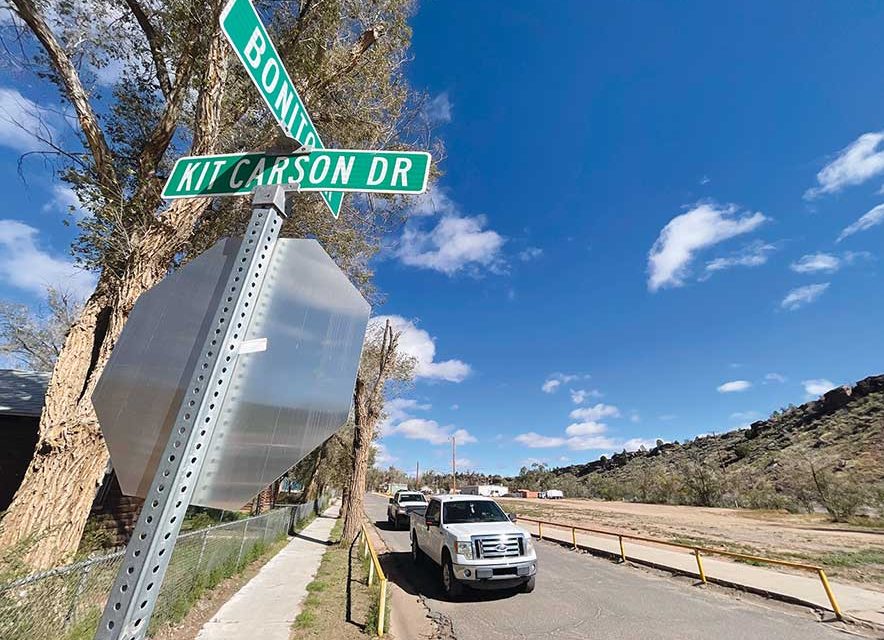
Delegate to request getting rid of Kit Carson’s name

Navajo Times | Donovan Quintero
A vehicle drives up to the stop sign at the intersection of Bonito Drive and Kit Carson Drive in Fort Defiance on Wednesday.
WINDOW ROCK
Delegate Mark Freeland wants to erase Kit Carson from all government properties, including monuments, parks, highways and streets, in New Mexico.
He even wants Kit Carson’s name to be removed from Kit Carson Park and Kit Carson Cemetery in Taos, New Mexico.
Freeland introduced legislation that still must go through a five-day comment period, which began on Wednesday. In his bill, he listed several reasons why Carson should not be celebrated anymore.

Navajo Times | Donovan Quintero
Dr. Aaron Price said his family was asked if the street name that is named after Kit Carson be changed to Hastiin Tséłbáí, who is his great-great grandfather. Hastiin Tséłbáí, or Pete Price, performed a BlessingWay Ceremony in 1938 for the newly constructed Fort Defiance Hospital. He was also known as Chief Silago, said Price.
“The Navajo people have continuously lived in the Southwest since time immemorial, but in 1863 Christopher (“Kit”) Carson, a colonel of the First New Mexico Volunteers, led a formal campaign and destructive war against the Navajo,” Freeland’s legislation says.
“Carson and his troops terrorized the Navajo people by burning crops, destroying homes, and slaughtering and killing livestock,” the bill says.
In 1863, Brigadier Gen. James H. Carlton ordered Carson to begin a “scorched earth” campaign against the Navajo people to force them to surrender and to relocate them to Fort Sumner, New Mexico.
Carson’s brutal methods of pillaging and destroying livestock and crops were successful. In March 1864, the Navajo people began the “Long Walk” to the military concentration camp – Hwéédi.
From 1864 to 1868, about 8,500 Navajo people endured what Freeland’s legislation described as “brutal.”
“While imprisoned at Fort Sumner, Navajos experienced slavery, starvation, prostitution, and disease,” the bill says. “It is estimated that between 1864 and 1868, more than 2,000 Navajos died at Fort Sumner.
“Kit Carson’s troops placed decedent’s remains in unmarked graves and prohibited Navajos from following their traditional burial practices,” the bill says.
Freeland said on Tuesday the COVID-19 pandemic gave him time to reflect on the subject.
“COVID has a lot to do with it,” he said. “I think about the 1,400-plus we loss to COVID. I thought about what our ancestors endured at Fort Sumner and what they went through.
“I thought on the 8,000 that went and the 4,000 that came back,” he said. “To think about where we are today at 400,000 because of them and their resiliency.”
He realizes the introduction of his bill has a ways to go. He anticipates it will most likely be amended to include Arizona, Colorado and Utah.
In Fort Defiance, on BIA property, a sign dedicated to the man Navajo history remembers not as a hero but as an evil man, names a street after him.
Dr. Aaron Price, whose great-great-grandfather, Hastiin Tséłbáí, blessed the Fort Defiance Indian Hospital in 1938, said Delegate Wilson Stewart contacted his family asking what they thought of renaming the street to honor the late medicine man.
Price, the chief of medicine at Tséhootsooi Medical Center, said he had not heard much else since Stewart approached his family.
“I think it was, it was more along the lines of just getting permission for the move forward,” Price said. “And from the consensus across the family, it sounds like it was an honorable suggestion to even be considered for name change as well, so we were completely on board.
“It kind of fizzled away,” he said.
Hastiin Tséłbáí, whose English name was Pete Price, once presented a blanket to King Albert and Queen Elizabeth in 1918, while they were visiting the area. The royal couple made a stop in Gallup.
King Albert, in turn, pinned silver medals on him. He was also known as Chief Silago.
Price compares Carson to George Armstrong Custer, who died in the Little Bighorn battle in 1876.
“He’s a pretty bad dude,” Price said of Carson. “I didn’t study him per se, but a lot of war crimes and he enacted against Native peoples (was) sort of along the lines of what Custer was to the Lakota people, that was Kit Carson to the Navajo Nation.”
He said if the recommendation to change the street name comes again, he was pretty sure his family would support it.
Freeland said his bill, when it’s introduced to the state, might get a “push back.”
He said he would request to speak to the New Mexico Indian Interim Committee on Oct. 19. He said he hopes to get it on the Legislature in January.
He added he is more than willing to working on changing the street name in Fort Defiance, too.
“It has to go through the process,” Freeland said. “I imagine it’ll get a lot of attention. It is the beginning of a movement. It is a recognition for Navajo, for our history.”
The city of Taos has an upcoming celebration that honors Carson on Dec. 21. The city also boasts the Kit Carson Museum, Kit Carson Park, Kit Carson Road, and Kit Carson Park and Cemetery.
Several lakes and rivers throughout the country also are named after him.







 Highway 264,
Highway 264, I-40, WB @ Winslow
I-40, WB @ Winslow